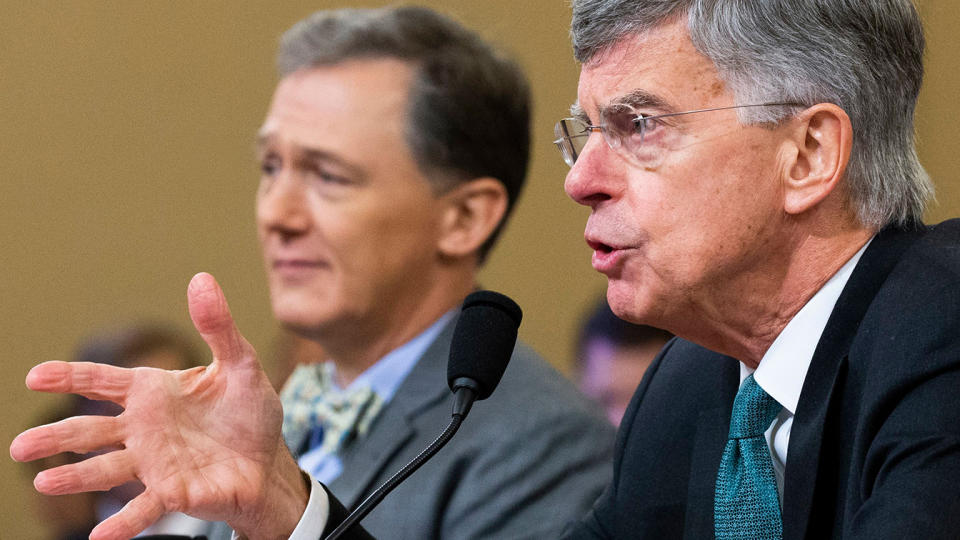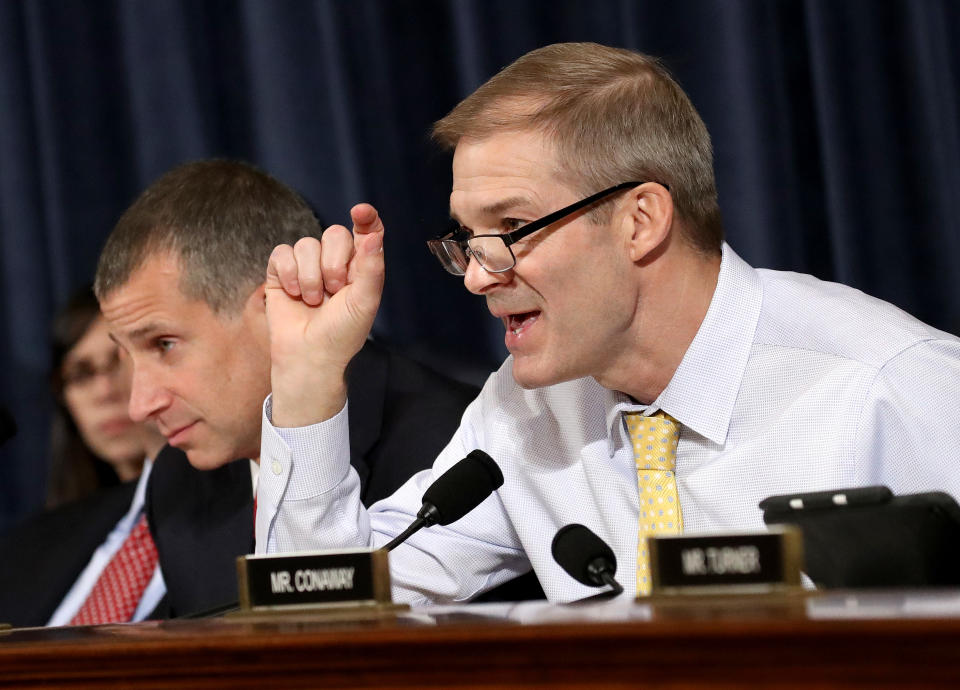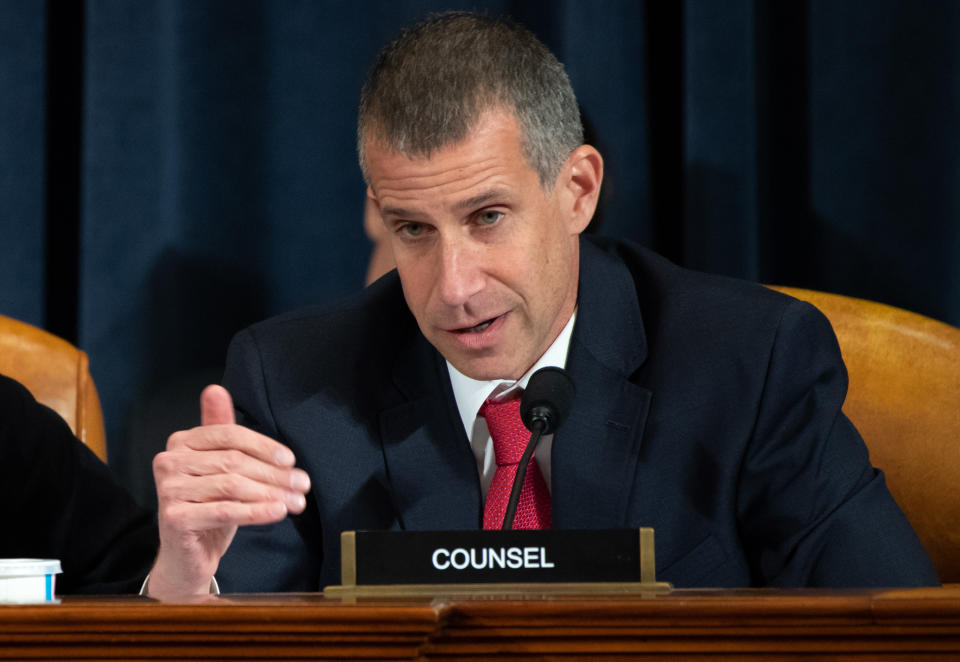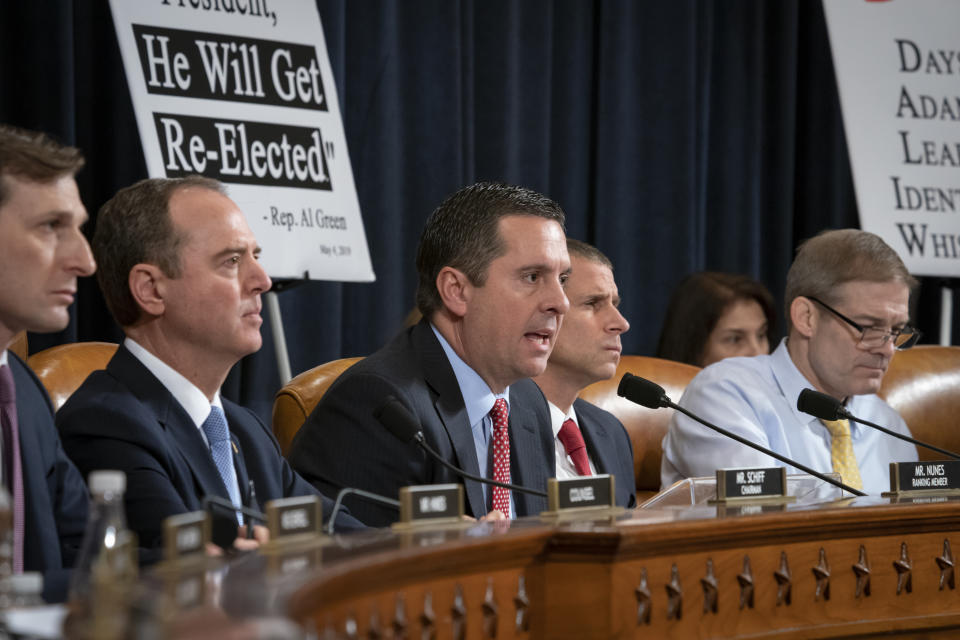Trump impeachment hearings: 5 key takeaways from the first day
The first day of public impeachment hearings resulted in new evidence supporting the Democrats’ case that President Trump was leveraging U.S. aid to Ukraine to get President Volodymyr Zelensky to investigate former Vice President Joe Biden. State Department officials Bill Taylor and George Kent, career diplomats who have served under multiple presidents, were the witnesses Wednesday before the House Intelligence Committee.
Here are the key moments from today’s testimony.
‘Trump cares more about the investigations of Biden’
While much of Taylor’s testimony had already been disclosed in the transcripts of his earlier, closed-door deposition, there was key new information. Taylor, the top U.S. diplomat in Ukraine, described a conversation in which Trump pressed the U.S. ambassador to the European Union, Gordon Sondland, for information about “the investigations.”
Taylor was not part of the call, which occurred on July 26, the day after the phone call between Trump and Zelensky that kicked off the investigation. He was told about it by an embassy staffer, who was meeting with Sondland at a restaurant when the ambassador placed a call to the White House. The staffer told Taylor that he was able to hear both ends of the conversation.
“Following the call with President Trump, the member of my staff asked Ambassador Sondland what President Trump thought about Ukraine,” Taylor testified. “Ambassador Sondland responded that President Trump cares more about the investigations of Biden, which [Rudy] Giuliani was pressing for.” Taylor said he had informed the State Department and both the majority and minority counsels for the Intelligence Committee as soon as he found out about the July 26 call. Under questioning, he clarified that he believed Sondland was saying that Trump cared more about the investigation into the Bidens than he did about Ukraine.

Trump, speaking at a press conference on Wednesday afternoon following a meeting with Turkish President Recep Tayyip Erdogan, said it’s the first he’s heard of the July 26 call with Sondland and called Taylor’s testimony “secondhand information.” When pressed, Trump said he didn’t recall the conversation at all, “not even a little bit.”
Sondland, a businessman who was appointed to the ambassadorship following large donations to the Trump inauguration, will testify next week. He dramatically altered his testimony from last month’s private deposition, saying he had “refreshed [his] recollection” and now remembered Trump tying foreign assistance to Ukraine to a public statement by Zelensky that Biden was under investigation.
In a September text message conversation with Sondland, Taylor said he thought it was “crazy to withhold security assistance for help with a political campaign.” Sondland said he had checked with Trump, who denied that was his intention. Taylor was asked about that during Wednesday’s hearing.
“Have you ever seen another example of foreign aid conditioned on the personal or political interests of the president of the United States?” asked Daniel Goldman, the staff lawyer asking questions for Democrats on the committee.
“No, Mr. Goldman, I’ve not,” said Taylor.
Rep. Will Hurd, R-Texas, said the statement that Giuliani sought from Ukraine on Trump’s behalf was meant to combat corruption in Kyiv. Kent said that wasn’t an accurate assessment. “That was not an anti-corruption statement,” said Kent, noting that Giuliani pushed to include specific references to Biden’s son Hunter’s business interests in Ukraine and to the 2016 election.
The Republican case

GOP members on the panel made a variety of arguments in the president’s defense.
Rep. Michael Turner, R-Ohio, hammered the point that neither Taylor nor Kent had ever met Trump and were relying on second- and third-hand sources. The administration has refused to allow acting White House chief of staff Mick Mulvaney to testify, and Giuliani has defied a subpoena, denying the inquiry of firsthand witnesses.
Rep. Jim Jordan, R-Ohio, who was added to the committee just last week in order to press the Republican case, argued that because Zelensky hadn’t expressed concerns to Taylor about the aid in their three meetings over the summer, there must not have been a problem. Taylor pointed out that Zelensky wasn’t aware the aid was being held up until the third meeting and that Ukrainian officials reached out after an August Politico article headlined “Trump holds up Ukraine military aid meant to confront Russia.”
Rep. John Ratcliffe, R-Texas, said that since Zelensky said publicly that Trump wasn’t extorting and blackmailing him, that means he wasn’t being extorted or blackmailed. Kent said his assessment was that Zelensky, who is dependent on American aid, could not afford to cross Trump in public.
Several Republicans noted that after Russia invaded Ukraine and annexed part of it in 2014, Taylor urged his superiors to provide “lethal aid” to Ukraine, but the Obama administration sent only “blankets,” whereas Trump had supplied arms, including Javelin antitank missiles. The point went unchallenged in the hearing, although fact checkers note that, in fact, by 2015 the United States had given millions to Ukraine in drones, armored Humvees, counter-mortar radars and night-vision gear.
Kent absolves Biden

Kent, deputy assistant secretary at the State Department overseeing European and Eurasian affairs, said there was no truth to the allegations that Biden had acted inappropriately as vice president. Representing the Obama administration, Biden had pushed for the removal of a Ukrainian prosecutor accused of corruption, a position shared by the European Union and the International Monetary Fund. The prosecutor had previously investigated a Ukrainian energy company that had given a lucrative board seat to Biden’s son. But the allegations against the company, Burisma Holdings, predated the younger Biden’s appointment to the board, which was described as an effort to provide international oversight in the notoriously corrupt Ukrainian energy industry, and a Ukrainian prosecutor cleared the Bidens of any wrongdoing.
“Mr. Kent, are you familiar as you indicate in your opening statement that you’re aware of these allegations related to Vice President Biden?” asked Goldman.
“I am,” said Kent.
“To your knowledge, is there any factual basis to support those allegations?” asked Goldman.
“None whatsoever,” said Kent.
“When Vice President Biden acted in Ukraine, did he act in accordance with official U.S. policy?” asked Goldman, to which Kent replied, “He did.”
Republicans’ lawyer rambles

Steve Castor, the chief minority counsel for the House Oversight Committee, drew online criticism from both Democrats and Republicans for his meandering line of questioning. Castor confronted Taylor and Kent about why they weren’t on Trump’s call to Zelensky, only for both to explain that under normal diplomatic procedure they wouldn’t be involved. Castor also sought to minimize what Taylor considered the impropriety of Trump setting up a backchannel diplomatic outreach to the Ukrainian government, enlisting Giuliani, Sondland (whose portfolio as ambassador to the European Union did not include Ukraine, which is not a member) and Energy Secretary Rick Perry. Taylor chuckled at Castor’s attempt to say the process was “irregular” but not “outlandish,” but conceded it was “not as outlandish as it could be.”
Castor did score a point in pressing Kent to admit that he had flagged concerns to the vice president’s office about Hunter Biden’s business activities in Ukraine, without results.
“Whatever the GOP counsel is doing, it’s not working,” wrote Ari Fleischer, who served as White House press secretary under George W. Bush. “I don’t [understand] where he’s going.”
“Lines up with what a few Republicans have said to me in the last few minutes,” wrote Politico’s Jake Sherman, retweeting Fleischer’s comment.
Nunes turns the attack on Democrats and the media

The opening statement from ranking member Devin Nunes, R-Calif., was largely about how Intelligence Committee Chairman Adam Schiff has handled the inquiry. He said that “Democrats conducted secret depositions” in the basement of the Capitol, implying that Republicans were excluded from the preliminary testimony, although they were present and given time to ask questions. Nunes also insulted Taylor and Kent, saying, “I’d like to congratulate you for qualifying for passing the Democrats’ star chamber auditions” and suggesting they were unwitting participants in a smear campaign against Trump.
Before witness testimony even began, Republicans pushed to interview the original whistleblower, whose report led to the announcement of a formal impeachment inquiry. Democrats have vowed to protect the whistleblower’s anonymity, insisting his testimony wasn’t necessary since his allegations have been corroborated by other witnesses.
“It won’t be my single decision,” Schiff said. “We will entertain a motion to subpoena any witness.”
What comes next?
There are additional hearings on Friday, Nov. 15, and next week from Nov. 19 to Nov. 21. See the full schedule here.
_____
Download the Yahoo News app to customize your experience.
Read more from Yahoo News:




